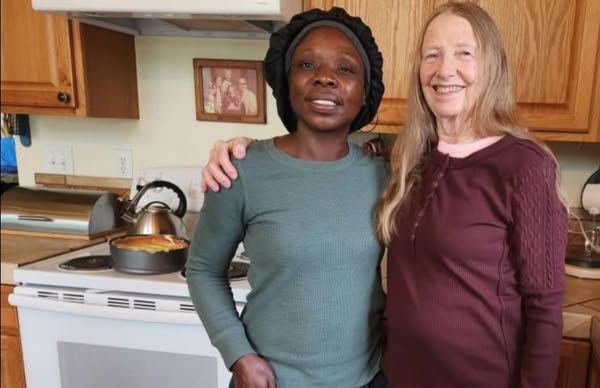Was There a Karketa Taylor Missing Report? Five Years After Georgia Woman Vanishes, Viral Post Sparks New Questions About Disappearances in the Shadows
In the unsettling corners of social media, where digital footprints meet unresolved tragedies, a single post can unravel the illusion of closure. Such was the case when Ada Smerek, a Georgia-based businesswoman, shared a seemingly innocuous photo on her Facebook page—a snapshot of a “hardworking woman named Karketa, a willing worker with a gentle spirit,” cleaning the floors of a vacation rental in Savannah. What was meant as a casual commendation quickly spiraled into a firestorm of confusion, concern, and revelation.
The woman in the photo was Karketa Taylor, a Georgia woman who, unbeknownst to Smerek and perhaps even herself, had been missing—at least, to someone—for over five years.
The Unraveling of a Mystery
Shortly after the post began to circulate, several individuals commented in disbelief. “That looks like Karketa Taylor,” one wrote. Another user added, “She’s been missing since 2020. Are you sure this is recent?” What followed was a flurry of messages, shares, and screenshot evidence linking the woman in the photo to old online posts, yearbook pictures, and even a church bulletin where she had once sung in the youth choir.
The question on everyone’s lips: Was there ever a missing person report for Karketa Taylor?
The answer remains as murky as the space Karketa now inhabits—alive, yet lost; present, yet seemingly invisible to those who once loved her.
The Gray Zone of Disappearances
Karketa’s story illustrates a haunting dilemma: What defines a missing person in a system that only responds when the proper buttons are pushed? If someone leaves of their own volition, especially as an adult, law enforcement often considers it a personal choice—no matter the circumstances.
Initial investigations reveal no public record of a formal missing person report filed for Karketa in 2020. That doesn’t necessarily mean no one noticed she was gone. It might mean no one with legal standing filed the paperwork, or that her disappearance didn’t meet the threshold of police urgency. It’s unclear whether family members searched for her privately, or whether she fell through the cracks of strained relationships, disconnection, or systemic neglect.
The uncomfortable truth is this: the system does not search for people it doesn’t know are lost.
Who Is Karketa Taylor?
According to fragments gathered from family acquaintances, Karketa Taylor was born and raised in Augusta, Georgia. She graduated from T.W. Josey High School and briefly attended community college before disappearing from known circles sometime in late 2020. Those who knew her described her as quiet but thoughtful, a deeply spiritual woman who occasionally struggled with stability and self-confidence.
One neighbor recalled seeing her leave her apartment “with only a backpack,” while another claimed she had been in a difficult relationship prior to her disappearance. No one can say for certain what happened in the years that followed—until the viral photo thrust her image back into the public eye.
Now, in 2025, she appears to be working as a domestic laborer under the informal employ of private homeowners, possibly without documentation or worker protections.
Modern-Day Slavery or Quiet Survival?
The photograph posted by Smerek reignited not only interest in Karketa’s well-being but a broader discussion about coercion, autonomy, and labor exploitation in America. Advocacy groups have raised concerns that Karketa may be among the thousands of vulnerable adults—often women of color—who fall into unregulated domestic work that borders on modern-day servitude.
Without documentation, contracts, or legal support, individuals in Karketa’s position may be working long hours for little pay, living under precarious conditions, and existing entirely outside the safety nets meant to protect them.
Yet others argue that the case isn’t so clear-cut. What if Karketa left to escape something? What if this was her attempt to rebuild a life, away from a past she couldn’t face? Can someone truly be missing if they don’t want to be found? Or does that mindset too easily absolve society from caring about the quietly disappeared?
A System Failing the Marginalized
Karketa Taylor’s situation raises an alarming point: How many people are missing in ways the system can’t or won’t track? Adults can legally disappear. If there’s no foul play, no clear threat, and no one with legal standing pushing for a case, people simply vanish—not just off the streets, but off the records.
Women of color are especially vulnerable to this form of erasure. The Black and Missing Foundation reports that missing Black women and girls often receive less media coverage and fewer investigative resources than their white counterparts. Their stories fade into silence, unless revived by chance—like a photo posted online.
Where Do We Go From Here?
For those who remember Karketa—family, friends, church members—the questions now are endless:
-
Is she safe?
-
Does she want to come home?
-
Was she ever truly missing, or just left behind by a system that didn’t try to look?
And for society at large, Karketa Taylor’s story demands a reckoning with how we define—and respond to—disappearances that fall outside clear categories. It’s not just about whether someone files a report. It’s about whether we care enough to look deeper, to ask better questions, to believe that being off the grid isn’t always a choice—it’s sometimes the only option left.
An Ongoing Investigation of the Heart
As of now, no law enforcement agency has confirmed an active investigation into Karketa’s current situation. Ada Smerek has since removed the original post and told local reporters she had “no idea the woman was thought to be missing” and was “cooperating fully” with any inquiries.
What remains is a picture—a still image that disrupted a narrative, reopened wounds, and revealed just how fragile the boundary is between “found” and “forgotten.”
If you have any information about Karketa Taylor’s whereabouts or well-being, please contact a local advocacy group, legal aid service, or your local law enforcement.
